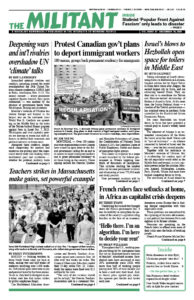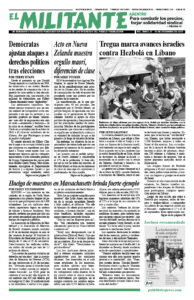At a meeting in Astana, Kazakhstan, Nov. 28, Russian President Vladimir Putin threatened to use hypersonic ballistic missiles against Ukraine’s urban areas, including Kyiv, a weapon he boasted could turn targets “into dust.” The Oreshnik missile, he said, could destroy even highly protected underground sites, creating blast sites that “reach 4,000 degrees.”
Working people in Kyiv, Kharkiv and other large cities often take refuge from Moscow’s attacks in the subway. Schools, concerts and other activities take place there as well.
These new missiles could be used against all kinds of targets, including “industrial enterprises, or decision-making centers, including in Kyiv,” Putin threatened.
In the first use of a missile capable of carrying nuclear weapons in its almost three-year war against Ukraine, Moscow dropped an Oreshnik missile on Dnipro Nov. 21. That missile was a test, carrying little to no explosives, causing limited damage to the city’s infrastructure and no deaths.
The strike came two days after Ukraine used U.S.-made long-range missiles to strike an ammunition depot in the Bryansk region of southwestern Russia.
Continuing its attacks on the people of Ukraine, Moscow’s forces fired more than 90 missiles and 100 drones Nov. 28 in a barrage that left nearly a million people without power as temperatures dropped to freezing. For the third time in three months, the attacks included strikes on critical electricity transmission facilities linked to nuclear power plants, which provide two-thirds of Ukraine’s power, increasing the risk of a nuclear disaster.
The strikes left more than half a million in Ukraine’s western Lviv region cut off from electricity. Another 280,000 in the western Rivne region and 215,000 in the northwestern Volyn region also lost power. Ukraine’s emergency services said Moscow’s overnight attack inflicted damage in 14 regions across the country.
Unlike Ukraine’s drone and missile attacks in Russia, which overwhelmingly target military facilities and suppliers, Putin’s attacks are aimed at crucial infrastructure and housing and are designed to inflict death, damage and misery on civilians.
“In several regions, strikes with cluster munitions were recorded and they targeted civilian infrastructure,” Ukrainian President Volodymyr Zelensky told the press, calling the attacks a “despicable escalation” of the war. These weapons are packed with smaller munitions that explode midair, causing indiscriminate damage. Some land unexploded, making it dangerous for repair crews to go into action.
Ukraine’s air defenses shot down 90% of the missiles, with falling debris damaging a health care clinic in Kyiv. One drone attack killed a woman in the southern city of Kherson.
The escalation by Moscow comes as the political and financial costs of the war bear down on Russia. Thousands of Russian soldiers continue to die in “meat wave” attacks in Ukraine. Ukraine’s military estimates that 2,030 Russian troops were killed or seriously wounded Nov. 29, the highest toll in any one day so far. It surpassed the 1,950 estimated casualties Nov. 12.
In November the value of the Russian ruble dropped to a 32-month low. Military spending hit the highest amount in over 30 years. And it is expected to reach more than $120 billion next year, over 30% of the country’s total annual budget.
With inflation already running at 8.5%, a video of a break-in at a local grocery store in Yekaterinburg hit the news. While one person ran to the cash register, the other went straight for the refrigerator, taking over 44 pounds of butter. Butter is now like “gold,” the storeowner said on Telegram, with one stick costing almost $2, some 30% higher than a year ago.
“It is getting worse day by day,” Stanislav, a Moscow resident, told CNBC. While declining to give his last name given the risks associated with criticism of Putin’s war, Stanislav said he knows the price rises are linked to the invasion of Ukraine. But, he said, he avoids many discussions about it. “It is dangerous to say something true in Russia,” he said.

